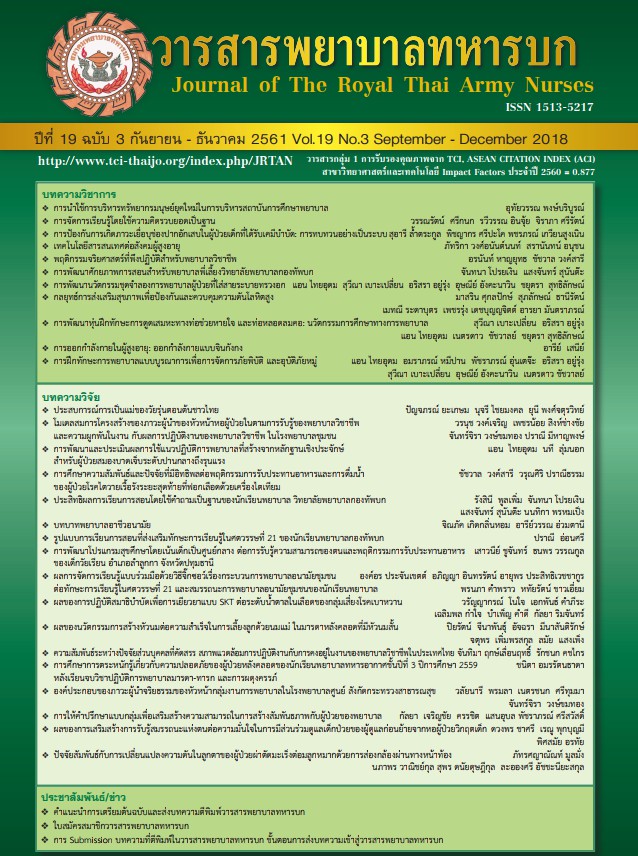Learning by Using Concept Based Instruction
Keywords:
instruction, Concept, Instructional designAbstract
The purpose of this article is to present instruction techniques based on concept that related among curriculum, methods of instruction and evaluation because instruction for effective application to the ability of learners should be associated with the brain function that collect all information in strong long term memory by data consolidation in the form of concept. Therefore, the instructors should emphasize the concept-based instruction that concentrates on the preparation of conceptual framework from all related contents, then incorporate the action learning to enable students to simulate the practicing of conceptual formation by themselves. Meanwhile, the evaluation should encompass the formative evaluation that reflects the development of conceptual cognition by students and the summative evaluation that reflects the result of conceptual cognition created by students themselves. The instruction that assimilates the concept-based learning by students would provide the foundation for the effective cognitive domain required for the 21st Century skills.
Downloads
References
2. Kiefer, M. & Pulvermuller, F. Conceptual representations in mind and brain : Theoretical developments, current evidence and future directions. Cortex 2012; 48 : 805-825.
3. Kunnika R., Arpharanee T., Pirin N. The effect of learning by using concept mapping with a case analysis : A case study of academic achievement and satisfaction in learning of adults and elderly nursingII. Hatyai Journal 2558; 12(2).113-122. (in Thai)
4. Paiwan,K., Suwimon,P., Apichai K. A scenario of education management of undergraduate nursing curricular in the context of ASEAN community. Journal of Health Science Research 2560; 11(2).18-27. (in Thai)
5. Handjaras, G. & Pietrini, P. How concepts are encoded in the human brain : A modality independent. Neurolmage 2016; 135 : 232-242.
6. Gagne, R, M., Briggs, L.J. & Wager,W.W. Principle of instructional design. Fort Worth : Harcourt 7. Thomson, T.L. The Learning Theories of Davis P.
Ausubel : The Importance of Meaningful and Reception Learning 2014.
8. Bruner, J., Goodnew, J.J. & Austin,G.A. A study of thinking. 1967, New York.
9. Lasater, K., & Nielsen, A. The Influence of concept-based learning activities on students’ clinical judgment development. Journal of Nursing Education 2009; 48 : 441-446.
10. Newmann, F.M., et.al. Authentic Instruction and Assessment : Common Standards for Rigor and Relevance in Teaching Academic Subjects. 2007, Des Moines, IA : Iowa Department of Education.
11. Scriven, M. Evaluation thesaurus. (4th ED.). Newbury Park 1991, CA.
12. Sinthuchai, S., Sawekngam,W. & Pasiphol, S. Development of an Instructional Model Based on Scaffolding and Reflective Practice Approach to Promote Clinical Decision Making Ability of Nursing Students. Journal of The Royal Thai Army Nurses 2560; 18(3) : 134-143. (in Thai)
13. Vilaivan T., et.al. Learning outcomes of work integrated learning in the course of practicum for nursing skills to professional readiness of nursing students. Journal of Nursing Science 2558; 31 (4). 79-89. (in Thai)
14. Chirawan W., Chaiwat S. & Chommanard W. Instructional model through the use of metacognitive strategies to enhance ability of transfer of learning and clinical problemsolving for nursing students. Journal of Nursing and Education 2559; 8(3).114-126. (in Thai)
Downloads
Published
How to Cite
Issue
Section
License
บทความหรือข้อคิดเห็นใดใดที่ปรากฏในวารสารพยาบาลทหารบกเป็นวรรณกรรมของผู้เขียน ซึ่งบรรณาธิการหรือสมาคมพยาบาลทหารบก ไม่จำเป็นต้องเห็นด้วย
บทความที่ได้รับการตีพิมพ์เป็นลิขสิทธิ์ของวารสารพยาบาลทหารบก
The ideas and opinions expressed in the Journal of The Royal Thai Army Nurses are those of the authors and not necessarily those
of the editor or Royal Thai Army Nurses Association.






